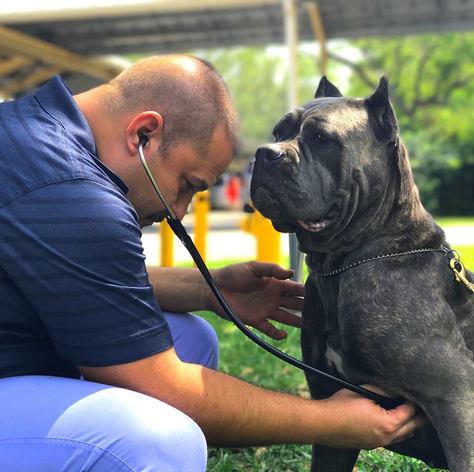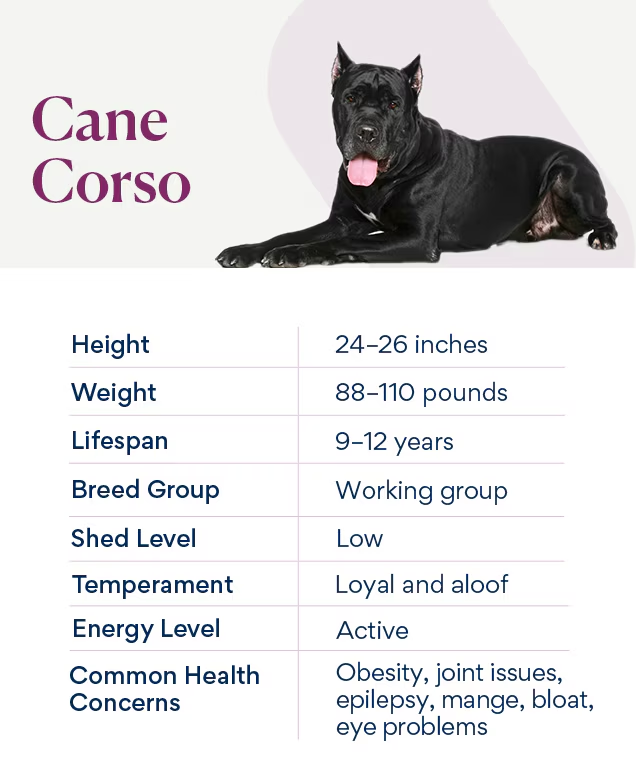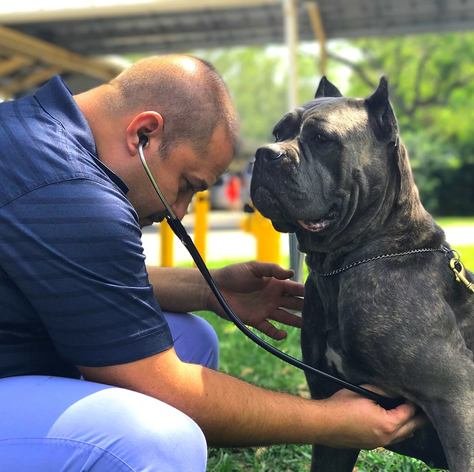When it comes to the health of the Cane Corso breed, there are certain factors to consider. While they are generally a robust and healthy breed, like any other breed, Cane Corsos can be susceptible to certain health problems. One surprising fact is that Cane Corsos are prone to certain orthopedic issues, such as hip and elbow dysplasia. These conditions can cause pain and mobility issues for the dog, requiring veterinary care and potentially expensive treatments. It’s important for potential Cane Corso owners to be aware of these health concerns and take necessary precautions.
In addition to orthopedic issues, Cane Corsos can also be prone to certain genetic health conditions. For example, they may be at higher risk for conditions like heart disease, eye problems, and certain cancers. Regular veterinary check-ups and screenings can help detect and manage these conditions early on, improving the chances of successful treatment. It is also crucial to provide proper nutrition, exercise, and a safe environment for Cane Corsos to minimize their risk of developing health problems. By being proactive about their health and providing the necessary care, Cane Corsos can live long, healthy lives.
Cane Corso dogs are generally healthy, but like all breeds, they can be prone to certain health issues. Some common health problems in Cane Corsos include hip and elbow dysplasia, bloat, cherry eye, and skin allergies. Regular vet check-ups and a balanced diet can help prevent or manage these issues. It’s important to choose a reputable breeder who conducts health screenings to ensure you get a healthy puppy. Proper care and attention to their health needs will help keep your Cane Corso happy and thriving.

Do Cane Corso Have Health Problems?
Cane Corso dogs are known for their strength, agility, and loyalty. As with any breed, it is important to understand the potential health issues that may affect them. In this article, we will explore the common health problems that can be found in Cane Corsos, as well as steps that can be taken to keep them happy and healthy.
Hip Dysplasia
Hip dysplasia is a genetic condition that can affect Cane Corsos. It occurs when the hip joints do not develop properly, leading to discomfort and mobility issues. This condition is more commonly found in larger dog breeds, and Cane Corsos are no exception.
While hip dysplasia is a hereditary condition, factors such as rapid growth, obesity, and excessive exercise can contribute to its development. Symptoms of hip dysplasia in Cane Corsos may include difficulty standing up or climbing stairs, a bunny hopping gait, and reluctance to exercise.
Treatment options for hip dysplasia in Cane Corsos include weight management, physical therapy, joint supplements, and in severe cases, surgery. It is important for owners to monitor their dogs for any signs of discomfort and consult with a veterinarian for proper diagnosis and treatment.
Gastric Dilatation-Volvulus
Gastric Dilatation-Volvulus, commonly known as bloat, is a serious and potentially life-threatening condition that can affect Cane Corsos. Bloat occurs when the stomach fills with gas and becomes twisted, preventing the dog from releasing the gas or vomiting.
Large, deep-chested breeds like the Cane Corso are more prone to developing bloat. The symptoms of bloat include restlessness, unproductive attempts to vomit, bloated abdomen, excessive drooling, and difficulty breathing.
Bloat is considered an emergency and requires immediate veterinary attention. Treatment for bloat typically involves decompression of the stomach, stabilization, and surgery to prevent recurrence. Owners can help prevent bloat by feeding smaller meals spread throughout the day, avoiding vigorous exercise after meals, and monitoring their dog’s behavior closely.
Heart Disease
Heart disease is another health concern that can affect Cane Corsos. The most common types of heart disease in dogs include dilated cardiomyopathy (DCM) and mitral valve disease (MVD). Both of these conditions can lead to heart failure if left untreated.
Certain factors, such as genetics, age, and obesity, can contribute to the development of heart disease in Cane Corsos. Symptoms of heart disease may include coughing, difficulty breathing, decreased exercise tolerance, and lethargy.
Treatment options for heart disease in Cane Corsos depend on the specific condition and its severity. Medications, such as diuretics and heart medications, may be prescribed to manage symptoms and slow the progression of the disease. Regular check-ups with a veterinarian are crucial for monitoring the heart health of Cane Corsos.
Other Potential Health Problems
In addition to the aforementioned health issues, Cane Corsos may be prone to other conditions such as:
- Entropion (eyelid disorder)
- Cherry eye (prolapse of the third eyelid)
- Hypothyroidism (underactive thyroid gland)
- Demodectic mange (parasitic mite infection)
- Obesity
Regular veterinary check-ups, a balanced diet, exercise, and proper grooming can help mitigate the risks of these health problems in Cane Corsos.
How to Keep Your Cane Corso Healthy
While Cane Corsos may be prone to certain health issues, there are steps that can be taken to help keep them healthy:
1. Regular Veterinary Care
Regular check-ups with a veterinarian are essential for maintaining your Cane Corso’s health. Vaccinations, preventive medications, and routine examinations can help detect any potential health issues early on.
2. Balanced Diet
Feed your Cane Corso a balanced and nutritious diet that is appropriate for their age and activity level. High-quality dog food, supplemented with fresh fruits and vegetables, can help support their overall health.
3. Regular Exercise
Provide your Cane Corso with regular exercise to keep them physically and mentally stimulated. Daily walks, playtime, and interactive toys can help keep them in good shape.
4. Weight Management
Monitor your Cane Corso’s weight and body condition to prevent obesity, which can exacerbate existing health issues. Consult with your veterinarian to determine the appropriate portion sizes and feeding schedule for your dog.
5. Grooming
Regular grooming, including brushing their coat, cleaning their ears, and trimming their nails, is important for the overall well-being of your Cane Corso. It also allows you to check for any signs of skin issues or abnormalities.
6. Socialization and Training
Proper socialization and training are crucial for Cane Corsos. Early socialization with other dogs and exposure to various environments can help prevent behavioral issues and promote good overall mental health.
7. Dental Care
Regular dental care, including brushing your Cane Corso’s teeth and providing dental chews or toys, can help prevent periodontal disease and maintain good oral health.
Conclusion
Cane Corsos can experience various health problems, including hip dysplasia, bloat, heart disease, and other potential issues. However, by being proactive in their care and providing proper nutrition, exercise, and regular veterinary check-ups, you can help minimize the risks and keep your Cane Corso healthy and happy.
Key Takeaways
- The Cane Corso breed is prone to several health problems due to their large size and genetic predispositions.
- Common health issues in Cane Corsos include hip dysplasia, elbow dysplasia, and osteochondritis dissecans.
- They are also prone to cardiac conditions such as dilated cardiomyopathy and arrhythmias.
- Cane Corsos may develop eye problems like cherry eye, entropion, and progressive retinal atrophy.
- Regular vet check-ups and proper nutrition can help prevent and manage these health problems in Cane Corsos.
Frequently Asked Questions
Cane Corso is a popular Italian breed known for its strength, loyalty, and protective nature. Like any other breed, Cane Corsos can be prone to certain health problems. Here are some common questions related to the health of Cane Corsos.
1. What are some common health problems in Cane Corsos?
Cane Corsos can be prone to several health issues, including:
– Hip dysplasia: This is a common genetic condition where the hip joint doesn’t develop properly, leading to lameness and pain.
– Dilated cardiomyopathy: This is a heart disease that affects the muscle tissue, leading to an enlarged and weakened heart.
– Entropion: This is an eyelid condition where the eyelid rolls inward, causing irritation and potentially leading to corneal ulcers.
– Gastric torsion: Also known as bloat, this is a life-threatening condition where the stomach twists, cutting off blood flow and causing rapid bloating.
– Hypothyroidism: This is a hormonal condition where the thyroid gland doesn’t produce enough thyroid hormones, leading to various symptoms and health issues.
2. Can these health problems be prevented in Cane Corsos?
While some health problems in Cane Corsos may have a genetic component, there are steps you can take to minimize the risk:
– Choose a reputable breeder who prioritizes health testing and selects breeding pairs with good overall health.
– Provide a balanced diet and appropriate exercise to maintain a healthy weight and promote overall well-being.
– Regular veterinary check-ups and screenings can help detect any potential health problems early and provide appropriate intervention.
– Stay vigilant for any changes in behavior, appetite, or physical condition and seek veterinary advice if you notice any concerns.
3. Are there any specific grooming requirements for Cane Corsos?
Cane Corsos have a short, dense coat that requires minimal grooming. Regular brushing to remove loose hair and occasional baths are usually sufficient to keep their coat in good condition.
Additionally, regular dental care, nail trimming, and ear cleaning should be a part of their grooming routine to maintain overall hygiene.
4. How can I ensure the overall well-being of my Cane Corso?
To ensure the overall well-being of your Cane Corso, consider the following:
– Provide a well-balanced diet that meets their nutritional needs.
– Regular exercise and mental stimulation are essential to keep them physically and mentally healthy.
– Socialize your Cane Corso from a young age to ensure they are well-adjusted and comfortable in different environments.
– Regular veterinary check-ups and preventative care, such as vaccinations and parasite control, are crucial for their overall health.
5. Can Cane Corsos live a long and healthy life?
With proper care, Cane Corsos can live a long and healthy life. The average lifespan of a Cane Corso is around 9 to 12 years, but some individuals can live even longer.
Providing a nutritious diet, regular exercise, proper veterinary care, and a loving environment can contribute to their longevity and overall well-being.

CANE CORSO HEALTH AND LIFE EXPECTANCY
In summary, the Cane Corso breed may experience certain health problems. It is important to be aware of these issues and take appropriate measures to ensure their overall well-being.
Regular vet check-ups, a balanced diet, exercise, and proper grooming can help prevent and manage potential health concerns. By providing consistent care, Cane Corsos can lead happy and healthy lives.
